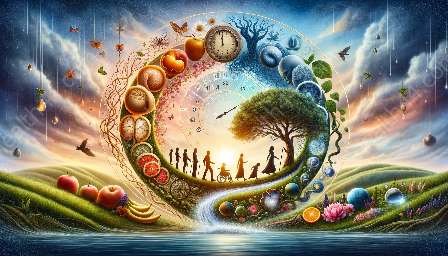As individuals age, their reproductive health often undergoes significant changes due to fluctuations in hormonal balance. These hormonal changes can have a profound impact on various aspects of reproductive health, including fertility, menstrual cycles, and sexual function.
The Physiology of Aging and Hormonal Changes
Throughout the aging process, both men and women experience hormonal fluctuations that can affect reproductive health. In women, the most noticeable change is the onset of menopause, which marks the end of fertility and is characterized by a dramatic decline in estrogen and progesterone levels. Men also undergo hormonal shifts as they age, including a gradual decline in testosterone production.
Effects on Fertility
Hormonal changes during aging can significantly impact fertility. In women, declining levels of estrogen and progesterone can lead to decreased egg quality and quantity, making pregnancy more challenging. Similarly, men experience decreased sperm quality and quantity due to age-related hormonal changes, which can contribute to fertility issues.
Menstrual Cycles and Menopause
For women, hormonal changes during aging can cause alterations in menstrual cycles. Irregular periods, changes in flow, and symptoms such as hot flashes and mood swings are commonly associated with the onset of perimenopause and menopause. These changes are directly related to hormonal fluctuations and can impact a woman's overall reproductive health.
Sexual Function and Libido
Hormonal imbalances during aging can also affect sexual function and libido. In both men and women, shifts in hormone levels can contribute to decreased libido, erectile dysfunction in men, and vaginal dryness in women. These changes may impact sexual satisfaction and overall reproductive health.
Reproductive Health in Relation to Aging
Reproductive health in relation to aging encompasses the broad range of physical, mental, and social well-being related to the reproductive system as individuals grow older. It involves understanding and addressing the unique challenges and changes associated with aging and their impact on reproductive health.
Wellness and Lifestyle Factors
Ensuring optimal reproductive health during aging involves maintaining a healthy lifestyle. This includes nutritious diet, regular exercise, and managing stress to support hormone balance. Additionally, seeking regular medical check-ups and screening for reproductive health issues is crucial for early detection and treatment.
Medical Interventions and Treatments
For individuals experiencing challenges with reproductive health due to aging-related hormonal changes, various medical interventions and treatments are available. Hormone replacement therapy, fertility treatments, and counseling are among the options that can help address specific reproductive health concerns associated with aging.
Embracing Change and Seeking Support
Approaching the changes in reproductive health due to aging with a positive mindset and seeking support from healthcare providers, as well as support groups, can greatly impact overall well-being. Open communication about concerns and exploring available resources can contribute to maintaining reproductive health and quality of life as individuals age.
Conclusion
Hormonal changes during aging have a profound impact on reproductive health. Understanding these changes, their effects, and seeking appropriate support and interventions are essential for maintaining overall well-being. By addressing the challenges related to aging and reproductive health, individuals can navigate this natural phase of life with resilience and confidence.


